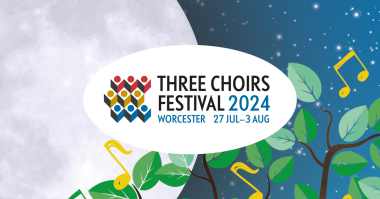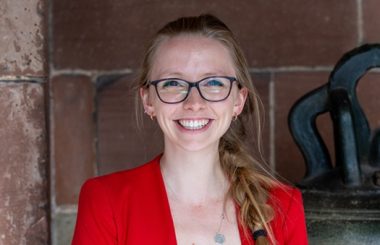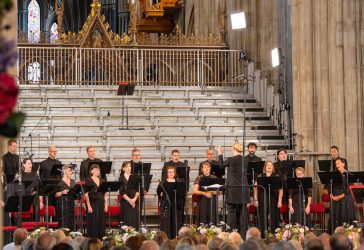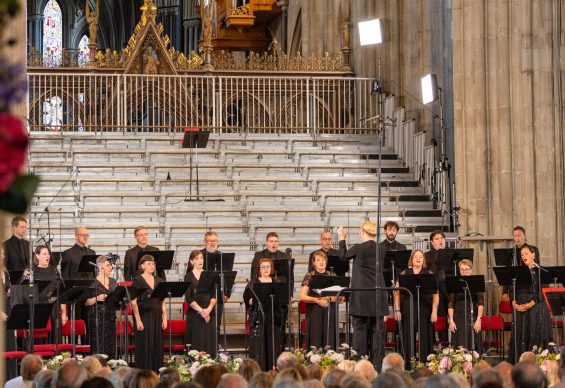
 United Kingdom Three Choirs Festival [4] – Arakelyan, Britten/Lapwood, Poulenc, Weir: Mark Padmore (tenor), Charles Gibbs (narrator), Anna Lapwood, Nicholas Freestone (organ), BBC Singers, Philharmonia Orchestra Ensemble / Sofi Jeannin (conductor). Worcester Cathedral 30.7.2024. (JQ)
United Kingdom Three Choirs Festival [4] – Arakelyan, Britten/Lapwood, Poulenc, Weir: Mark Padmore (tenor), Charles Gibbs (narrator), Anna Lapwood, Nicholas Freestone (organ), BBC Singers, Philharmonia Orchestra Ensemble / Sofi Jeannin (conductor). Worcester Cathedral 30.7.2024. (JQ)

Kristina Arakelyan – Seascapes (2021) interspersed with Britten (trans. Anna Lapwood) – Four Sea Interludes from Peter Grimes (1945, trans. 2021, Lapwood organ)
Poulenc – Figure humaine FP 120 (1943/44)
Judith Weir – In the Land of Uz (2017, Freestone organ)
On the hottest day of 2024 so far, it was not just a pleasure but also a relief to see the BBC Singers at the Three Choirs Festival tonight. Knowing how far into the future the diaries of professional musicians are booked, I imagine that their invitation to appear at the 2024 Festival had been under discussion for some time in advance; but back in 2023 it must have seemed unlikely that the BBC Singers would be able to appear at the Festival since their very existence was under significant threat from BBC bean counters. Happily, it seems that the existential threat has at least receded and the BBC Singers duly came to Worcester just before the start of their centenary season (2024-25). They can trace their origins back to 1924 when Stanford Robinson formed a group known as The Wireless Chorus. Since then, the ensemble, under a variety of names, has been an essential part of the BBC’s music output. In recent decades they have forged a reputation not just for the wide range of their repertoire but also for their service to contemporary music. Among the countless premieres which the group has given were all three of the choral pieces on tonight’s programme.
For the start of this concert they were joined by the high-profile young organist Anna Lapwood (b.1995) to play her transcription of Britten’s Four Sea Interludes from Peter Grimes. I must admit that when I first saw the announcement of the programme, months ago, I raised my eyebrows slightly at seeing that the Interludes were to be ‘interspersed with’ music I did not know. I am so used to hearing the Interludes played consecutively as a concert item but, on reflection I reasoned that in the full opera they occur not together but at various points in the score. At that stage I was unaware that the BBC had commissioned the Armenian-British composer, Kristina Arakelyan (b.1994) to compose Seascapes specifically so that her choral pieces would complement the Lapwood transcriptions. In that joint format, Seascapes was first performed, by the BBC Singers, in October 2021. The combination of the Sea Interludes and Seascapes takes about 45 minutes to perform, though both elements can be performed as standalone items; I would like to hear Seascapes in that way at some future date.
Anna Lapwood’s transcription project began with ‘Dawn’ which she transcribed a while ago, as an independent item, for a recital as part of the Aldeburgh Festival. Over the following couple of years, she transcribed the remaining three Interludes. She included the full set on an album entitled Images, which she recorded on the organ of Ely Cathedral in 2021; I have not heard that disc (review here). These transcriptions were new to me and I have to admit to mixed feelings. On the one hand, there is no denying the imagination, flair and skill with which the transcriptions have been carried out and it’s intriguing to experience the music in a new way. However, though I tried to listen with open ears I found myself missing certain things from the familiar orchestral scoring. For instance, I missed the snap of the brass as ‘Sunday Morning’ reached its climax and in the concluding ‘Storm’ the wonderful harp swirls near the end were sorely missed, as were the incisive percussion interjections. To set against that, however, the organ version, and Lapwood’s imaginative registrations on the cathedral’s Tickell instrument, brought out a welcome amount of inner detail. And, of course, the music was played with great virtuosity.
I was very taken with Seascapes. Here, Arakelyan has taken four poems by Christina Rossetti and scored them for a cappella SSAATTBB choir. The poems were perceptively chosen and the music was thoughtfully designed so that each choral item complemented the preceding Britten piece. I admired Arakelyan’s choral writing; the melodic lines were very attractive and the harmonic language was interesting and evocative. The highlight for me was the third setting, ‘Echo’. Here, the composer sets the poem which begins ‘Come to me in the silence of the night’. Her setting is slow-moving and intensely beautiful. Truth to tell, though, all four settings are very fine and eloquent; they are also extremely well-imagined for voices. I am keen to hear Seascapes again.
To close the first half Sofi Jeannin and the BBC Singers performed Poulenc’s Figure humaine. Poulenc wrote these eight settings of poems by Paul Éluard in 1943. He hoped the set could be premiered in France as soon as the country was liberated from the Nazis but this proved to be impossible. The score was sent to England where it was premiered by the BBC Chorus (forerunner of the BBC Singers) under their director Leslie Woodgate on Palm Sunday, 25 March 1945. The work thus has an important part in the history of the BBC Singers but it also featured significantly in their recent history. When the ensemble was under existential threat in 2023, the musical establishment rallied to their cause to an impressive degree. One of the most public displays of support came from Sr Simon Rattle. In April 2023 he was due to conduct the LSO in Mahler’s huge Seventh symphony. At short notice, he invited the BBC Singers to perform under his direction after the Mahler; the chosen work was Figure humaine (review here). Four months later, at the Proms, Rattle repeated this very practical and public gesture of support (review here).
I believe that the original impetus to Poulenc came in the form of an invitation to set one poem, ‘Liberté’; the project expanded and that poem became the culmination of a much larger cantata for two unaccompanied six-part choirs. Introducing the piece for the future BBC Radio 3 broadcast, Ian Skelly very justly observed that Figure humaine required ‘supreme stamina’ from a choir and was ‘not for the faint-hearted’. It does indeed make virtuoso demands on performers, not merely to negotiate the notes but also to interpret the music – and the texts. In the BBC Singers we had an ensemble ideally equipped for the assignment. The singing was superb from first to last. I was very taken with the way the deep melancholy of the first poem, ‘Bientôt’ (‘Soon’) was put across. The fast, biting music in ‘Le Rôle des Femmes’ was delivered with panache, as was Poulenc’s move into trademark bittersweet harmony later in the same setting. In the fifth poem, ‘Première Marche la voix d’un autre’ (‘First march, the voice of another’), I was greatly impressed by the pinpoint accuracy in delivering the quick music, something which was a feature elsewhere in the cycle. Everything leads up to ‘Liberté’, of course. It is remarkable how Éluard relates the burning thirst for liberty to humdrum, everyday things. Poulenc’s music begins almost innocently but the pace and the intensity are wracked up until the setting becomes an anguished but determined cri de cœur for freedom. Jeannin and her colleagues gave a stunning account of ‘Liberté’. Figure humaine is an unequivocal masterpiece and tonight’s magnificent, searingly intense performance was fully worthy of it.

After the interval we heard one work, Judith Weir’s In The Land Of Uz. This work was commissioned by Radio 3 and was first performed in Southwark Cathedral, London during the 2017 Proms, by the BBC Singers under their then Chief Conductor, David Hill. It is scored for SATB chorus, solo tenor, narrator and a small instrumental ensemble consisting of viola, double bass, soprano saxophone, trumpet, tuba and organ. Tonight, the tenor soloist, taking the role of Job, was Mark Padmore. I was very surprised to learn that this was the Three Choirs debut of this distinguished singer; I hope he will be invited back soon. The narrator was Charles Gibbs, one of the BBC Singers’ basses. Members of the Philharmonia provided the ensemble along with organist Nicholas Freestone, Worcester Cathedral’s Assistant Director of Music. Chief among the instrumentalists was violist, Cameron Campbell, his instrument functions as the alter ego of Job.
I had not heard In the Land of Uz before. Judith Weir explained in a programme note that the work ‘is a dramatised reading of the biblical Book of Job, from which all the text is taken, in the musical form of a cantata, or short oratorio. The majority of the music is sung by the chorus, but there are also “obbligato” roles for a small group of instruments which appear singly or in pairs; viola, double bass, soprano saxophone, trumpet, tuba and organ. Job appears from time to time as a solo tenor; his thoughts are also represented by the viola. Although the bulk of the storytelling is undertaken by the chorus, a speaking narrator also makes occasional appearances.’
All the drama is in the music; this is a concert work, not one conceived for the stage. It is an extraordinary composition, and a bold one. The vocal writing is fascinating and demanding. Padmore was an ideal soloist; his plangent, clearly ringing voice carried easily to my seat halfway down the nave and, as is always the case with this fine artist, he invested the words with great expression. His was a compelling performance. Charles Gibbs was a fine narrator. He was positioned in the pulpit from where he could be very clearly heard. He delivered the narration with great intelligence. The instrumentalists dip in and out of the ‘action’ according to their role within Weir’s compositional scheme. So, for example, the soprano saxophone appears principally during the episode of Job’s Comforters (just as in Vaughan Williams’s great Job. A Masque for Dancing). The tuba is not heard until quite late on in the work when that instrument, along with the basses of the choir, invests the words of God with dark majesty. Just before that point the trumpeter and organ combine thrillingly to illustrate the whirlwind. Violist Campbell had the most to do among the instrumentalists; the nutty sound of his instrument was ideally imagined by Weir to voice the inner thoughts of Job and Campbell played with notable eloquence. The BBC Singers delivered the complex choral parts with all the incisiveness and dramatic intensity that one would expect from this fine ensemble. Sofi Jeannin controlled the performance expertly, bringing all the disparate vocal and instrumental forces together seamlessly.
As I said, In the Land of Uz is an extraordinary work. I don’t believe a recording has been made but, in any case, I wonder if the piece would make quite the same impact on CD or radio. Though there is no physical ‘action’, I think it’s one of those pieces that is best experienced when one can see as well as hear the performers. That said, I shall listen with interest when the concert is broadcast on Radio 3 in due course. There was a substantial audience for this concert and both the performers and Judith Weir were warmly applauded, indicating that In the Land of Uz had made its mark.
This was a challenging but rewarding concert, superbly performed. As I listened to the music, I reflected that probably only the BBC could or would mount such a programme – and credit to the Three Choirs Festival for taking the commercial risk of hosting it. We must be grateful that the BBC Singers have survived but vigilance will be required to prevent the Corporation from trying to take the axe to this extraordinary ensemble at a future date. The BBC Singers are a vitally important part of the UK’s musical life, especially as regards contemporary music; we would all be poorer without them.
The concert was recorded for transmission on BBC Radio 3 in the autumn when the BBC Singers’ centenary series is under way.
John Quinn
